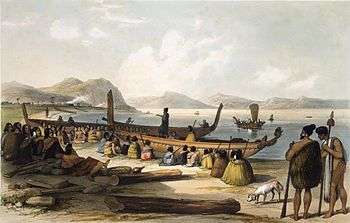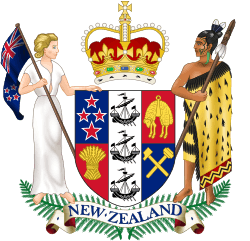Waka-jumping
New Zealanders speak colloquially of waka-jumping when a member of Parliament (MP) switches political party between elections, taking their parliamentary seat with them and potentially upsetting electoral proportionality in the New Zealand Parliament.[1]

Waka jumping legislation
The implementation of the mixed-member proportional (MMP) electoral system following a referendum in 1993 led to a series of defections and re-alignments as the former two-party system adjusted to the change. This led to the rise and fall of a number of political parties in New Zealand, including the creation of New Zealand First and ACT. The new political climate tended to favour the establishment of new political parties (whereas in former times dissidents had often simply become independent MPs). In the two previous parliaments before the Act was passed, 22 MPs defected.[2]
Due to the frequency of waka jumping, New Zealand enacted the Electoral (Integrity) Amendment Act 2001, which had been introduced by Labour Party associate justice minister Margaret Wilson in 1999 but had been promoted by Labour's coalition partner Alliance ahead of that year's general election. The Act expired at the 2005 election as the sunset clause came into effect. It required any MP who had entered Parliament via a party list to resign from Parliament if they left that party's parliamentary caucus.[3] However, parties were still able to find ways around this law. When the Alliance split in 2002 over how to respond to the invasion of Afghanistan, Jim Anderton nominally remained the leader of the Alliance within Parliament, while campaigning outside Parliament as the leader of the newly-founded Progressive Party.[4] The resulting uncertainty around the Alliance’s position contributed to then-Prime Minister Helen Clark’s decision to call an early general election in 2002.[5] While the law was in force, it was used once to expel a list MP from Parliament (an electorate MP who changed parties could still fight a by-election, as Tariana Turia did[6]). In December 2003, the ACT Party caucus voted to expel Donna Awatere Huata, an ACT list MP who became an independent after being charged with fraud.[7] The expulsion became the subject of litigation, and Awatere Huata was not expelled from Parliament until a Supreme Court decision handed down in November 2004.[8] A proposed Bill to replace the Act in 2005 failed.[9]
The Electoral (Integrity) Amendment Act 2018[10] received Royal Assent on 3 October 2018 and entered into force in New Zealand the next day. The provisions on waka-jumping now appear after section 55AA of the Electoral Act 1993.[11] Under these provisions, members of Parliament who choose to leave their party, or who are expelled from their party, are automatically expelled from Parliament, with the seat becoming vacant.[12][13] Unlike the 2001 Act, the 2018 Act did not have a sunset clause so remains in force until it is deliberately repealed. This Act was passed as part of the coalition agreement between New Zealand First and the Labour Party and supported through Parliament "begrudgingly" by the Green Party under the terms of their own confidence-and-supply agreement with Labour.[14][15]
A member's bill in the name of National Party MP David Carter with the intent of repealing the Electoral (Integrity) Amendment Act 2018 was introduced into Parliament in July 2020.[16] The Green Party defied other government parties to support the repeal bill,[17] which will be considered by a select committee after the 2020 general election.
Etymology
The Māori word waka applies often to a large Māori canoe (or any vehicle). The term waka-jumping is a variant on the phrase "jumping ship". Waka hurdling is a traditional sport of jumping Māori canoes over suspended logs.
List of waka-jumpers
MMP era
Historic waka-jumpers
Notes
- 1.^ After becoming an Independent politician, Peters successfully contested a by-election in his Tauranga electorate.
- 2.^ After switching to the Maori Party, Turia had to contest a by-election, in line with the ban on waka-jumping then in force. She won the resulting contest in Te Tai Hauauru.
- 3.^ After crossing to the Mana Movement, Harawira successfully contested a by-election in his constituency of Te Tai Tokerau.
References
- "Maori Party vote vital to save 'waka-jumping act' – National – NZ Herald News". The New Zealand Herald. 23 October 2005. Retrieved 5 December 2011.
- "Electoral (Integrity) Amendment Bill — First Reading". Hansard. 6 December 2005.
- "Electoral (Integrity) Amendment Act 2001". Act No. 105 of 21 December 2001 (PDF).
- Geddis, Andrew (2002). "Party-hopping". New Zealand Law Journal: 137–138.
- Martin, John (2004). The House: New Zealand's House of Representatives, 1854–2004. Palmerston North: Dunmore Press. p. 330. ISBN 0-86469-463-6.
- Geddis, Andrew (11 January 2018). "Who controls the past now, controls the future". Pundit. Retrieved 27 May 2017.
- "ACT Caucus Votes to Expel Donna Awatere Huata" (Press release). ACT New Zealand. Scoop. 16 December 2003. Retrieved 27 May 2018.
- Taylor, Kevin (19 November 2004). "Awatere facing expulsion from Parliament after court decision". The New Zealand Herald. Retrieved 27 May 2018.
- "Electoral (Integrity) Amendment Bill 3-1 (2005), Government Bill – New Zealand Legislation". www.legislation.govt.nz. Retrieved 24 May 2018.
- "New Zealand Acts: Electoral (Integrity) Amendment Act 2018". New Zealand Legal Information Institute. Retrieved 24 July 2020.
- "New Zealand Legislation: Electoral Act 1993". Parliamentary Counsel Office. Retrieved 24 July 2020.
- Craig McCulloch (27 September 2018). "Waka-jumping bill passes into law after heated debate". Radio New Zealand. Retrieved 24 July 2020.
- Zane Small (2 July 2020). "National Party 'prepared to work with the Greens' to repeal 'waka-jumping' legislation". Newshub. Retrieved 24 July 2020.
- "Waka-jumping bill passes into law after heated debate". RNZ. 27 September 2018. Retrieved 2 August 2020.
- "Waka jumping bill finally passes, with begrudging support of Green Party". Stuff. 27 September 2018. Retrieved 2 August 2020.
- "Members' bills: Defying sad odds". RNZ. 2 July 2020. Retrieved 2 August 2020.
- "Dead rat spat back up: Green Party vote to repeal waka jumping law with National, infuriating Winston Peters". Stuff. 29 July 2020. Retrieved 2 August 2020.
- Boston; et al. (1996). New Zealand Under MMP: A New Politics?. Auckland: Auckland University Press. p. 51. ISBN 1869401387.

